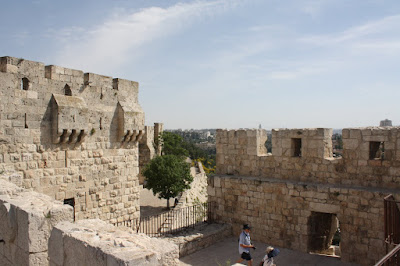If you're like me, you view the Holy Land as the nation of Israel, that contains the places where Jesus' life took place, where Judaism has its home, and maybe a couple other things. I really didn't know a ton. I remember hearing about the Gaza strip a couple years ago, and occasionally it has popped up on the radar of international news, among a myriad of other things in my day to day life, even though I think of myself fairly in tune with world news and current events.
On this trip we have four steps. See, Immerse, Contend, Restore. The idea of seeing somebody is the first step in understanding anyone. In a conflict, I think its the first thing that we don't want to do. We argue with a friend, a spouse, anyone, and as soon as we get in to the conflict we stop seeing the other person. We tend to simply think about our view and how it has been infringed upon, and how to show this other jerk how to see how much of an idiot he/she/it is.
We've had an opportunity to see a lot while we're here. We have seen Israel. We have seen where Jesus' life took place. We have seen where the heart of Jewish history and culture now lives. We've seen a lot more than that too, now. We've seen the Muslims who live here. We've seen the Christian quarter. We've seen the Arab community that lives in Jerusalem. We've seen historical sites. We have seen a lot. We have seen Palestine. There's a saying here that "there are dead stones and there are living stones". I think that might be my favorite saying, let me explain.
In any touristy area in the world, there are the sights, and the people who exist watching people come and see the sights. Although there is much deeper meaning here than say, the spoon and cherry in Minneapolis, it still has the same feeling of people just touring to tour.
On Wednesday we went to Aida camp. In 1948, Israel went to war with Palestinians who objected to the creation of Israel after world war II. As is the case with any war, the casualties end up often being civilians. Israel won the war, and refer to it as the War of Independence. Palestine lost, and refer to it as "The catastrophe". Since then there have been numerous conflicts, political posturing, solutions proposed, ending in more of the same.
Because of all this there are places like Aida camp. A refugee camp established in 1948 for Palestinian refugees who we're told to leave their homes for their protection, with the promise that they would return in days, or weeks. They left so quickly that all they took with them was a key to their home they expected to return to. The weeks ended up being years, 49 and counting. The key is a reminder that they still have a home to return to, although those homes have been demolished and/or are located in Israel.
The camp has generations of Palestinian refugees in it. Located right on the border of the West Bank, it is about .75 square miles, and home to 5,000 people. We spoke with Mohammed, a young man who runs the youth center. His grandfather founded it and it has stayed part of the family ever since. It is a 4 story building that has two floors of gathering rooms, and 3 floors above it that are cement shells. I asked Mohammed if they are in process of building it up, and he said it has been demolished twice by the Israeli Army, and they continue to rebuild.
When we begin to See, we have to realize there are things we choose not to see. What I didn't see was most of this conflict. What I saw was the news. What I saw was other peoples opinions and thoughts on the topic. What I see now is a real person who lives in an under developed, over populated community, with a view of a 20 foot wall, and if he stands on top of the youth center, a view over the wall of hills with olive trees and new modern Israeli homes. I saw the sniper tower 200 yards away with a sniper in it. I saw the Mural with the names of 263 Palestinian children killed in the Gaza war in 2014.
I also saw children with smiles on their face. That happily greeted these strange American visitors. I saw people who made us a meal. I saw love. I saw humanity that has been set aside but will not let their circumstances imprison their minds, hearts, or passion for peace.
We all have walls. Whether we put them up, or they we're put up for us. There are two sides of every wall, and there are stories on each side. Most importantly, there are people that God created on both sides of that wall. Both Sides. Both Sides.

















